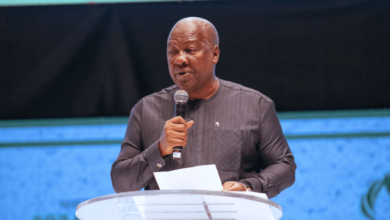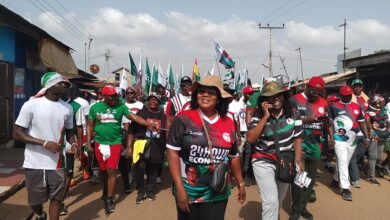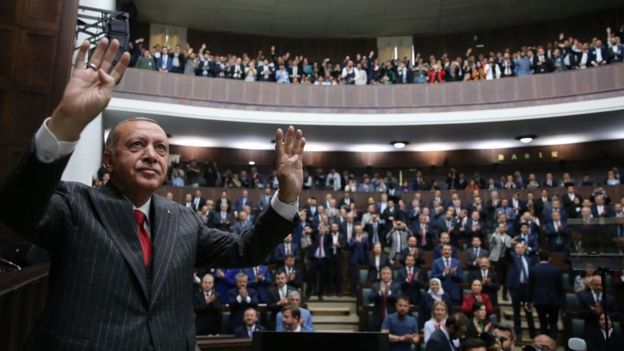
Istanbul’s mayoral election was affected by “organised crime and serious corruption”, Turkish President Recep Tayyip Erdogan says.
Mr Erdogan was defending the decision to re-run the 31 March vote, which returned a slim win for the opposition.
Opposition candidate Ekrem Imamoglu, who has been stripped of his duties, described the move as “treacherous”.
The European Parliament also said the decision would end the credibility of democratic elections in Turkey.
The decision to hold a new vote, which will be held on 23 June, sparked protests across the city on Monday. Hundreds of people gathered in several districts, banging pots and pans and shouting anti-government slogans.
The opposition sees the move by the electoral authorities as bowing to Mr Erdogan’s pressure, says the BBC’s correspondent Mark Lowen.
Istanbul’s Governor Ali Yerlikaya has been assigned as the acting mayor of the city until the new vote.
What did the president say?
Speaking at a parliamentary meeting of his AK Party, Mr Erdogan said that re-doing the vote was the “best step” for the country.
“We see this decision as the best step that will strengthen our will to solve problems within the framework of democracy and law,” he said.
He insisted there was “illegality” in the vote and said a re-run would represent “an important step to strengthen our democracy”.
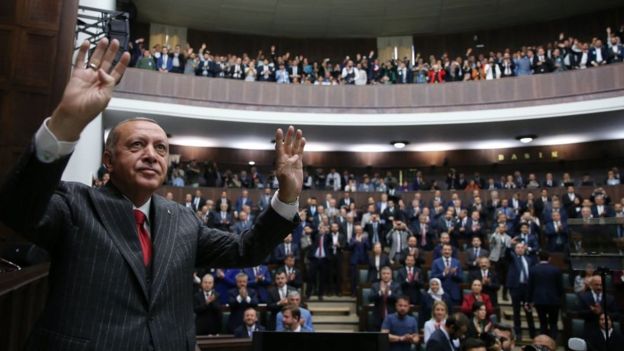
The president, who first came to power in 2003, also said “thieves” had stolen the “national will” at the ballot box, adding that if they were not held to account “our people will demand an explanation from us”.
Why is the vote being re-held?
An AKP representative on the electoral board, Recep Ozel, said the re-run was called because some electoral officials were not civil servants and some result papers had not been signed.
But CHP deputy chair Onursal Adiguzel said the re-run showed it was “illegal to win against the AK Party”.
Mr Adiguzel tweeted that the decision was “plain dictatorship”.
“This system that overrules the will of the people and disregards the law is neither democratic, nor legitimate,” he wrote.
And in a speech broadcast on social media, CHP’s Ekrem Imamoglu, who was confirmed as Istanbul’s mayor before being stripped of the title, condemned the electoral board and said they were influenced by the ruling party.
“We will never compromise on our principles,” he told the crowd. “This country is filled with 82 million patriots who will fight… until the last moment for democracy.”
A supporters’ group for Mr Imamoglu urged restraint, saying: “Let’s stand together, let’s be calm… We will win, we will win again.”
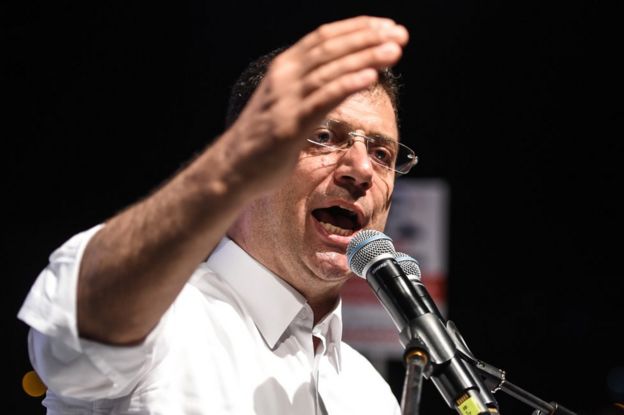
What has the international reaction been?
The European Union called for Turkey’s election body to explain its reasons for the re-run “without delay”.
“Ensuring a free, fair and transparent election process is essential to any democracy and is at the heart of the European Union’s relations with Turkey,” the EU’s diplomatic chief, Federica Mogherini, said in a statement.
Germany’s Foreign Minister Heiko Maas said the decision was “not transparent, and incomprehensible to us”.
The French government also said the Turkish authorities needed to show “respect for democratic principles, pluralism, fairness [and] transparency” in the new poll.
What is the background?
Municipal elections took place across Turkey on 31 March and were seen as a referendum on Mr Erdogan’s leadership amid a sharp economic downturn.
Although an AKP Party-led alliance won 51% of the vote nationwide, the secularist CHP claimed victory in the capital Ankara, Izmir, and in Istanbul – where Mr Erdogan had once been mayor.
In Istanbul, more than 8 million votes were cast and Mr Imamoglu was eventually declared the winner by a margin of less than 14,000.
The ruling party has since challenged the results in Ankara and Istanbul, which has prompted opposition accusations that they are trying to steal the election.

Erdogan determined to retake Istanbul

President Erdogan was in typically conspiratorial form, slamming what he called “the dark circles, economic saboteurs and so-called elitists” who were attacking Turkey and collaborating to “rob the nation of its will”.
He was never going to take the loss of Istanbul lying down. “Whoever wins Istanbul wins Turkey”, he has often said. He is determined to win back the country’s economic powerhouse.
But it’s a strategy fraught with risk. The Turkish lira – which has lost more than 30% over the past year – has slumped again. An economy in recession can hardly cope with more uncertainty. After all, it was economic woes that lost Istanbul for Mr Erdogan in the first place.
What’s more, Ekrem Imamoglu, who was formally appointed mayor last month, is gaining popularity, fast. He’s reached out beyond his base and has settled into the role with ease. The re-run could widen his win – barring major irregularities against him, which many of his supporters fear.
And Mr Erdogan’s own party is deeply split on the issue. His diehard loyalists believe victory was stolen. But other wings of the party accept they lost, and that rejecting the result is another nail in the coffin for what’s left of Turkish democracy.


